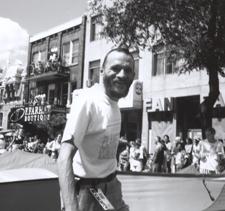“I don’t feel more special than anyone else.”
It’s one of the first things Kevin Hatt says, reclining carefully in his lawn chair in the balcony sunlight. He cradles a cup of coffee in one hand, gesturing delicately with the other.
“And it wasn’t planned,” he says, thinking back over his 30 years of agitating on behalf of queer people.
“I just coincidently fell into it. One thing led to the next. I can’t even pinpoint the start, really. It’s just that right after I came out, Harvey Milk died. Then there was the [Anita Bryant] orange juice boycott. Somewhere in there, I started thinking I wanted to be involved. I wanted to make a change.”
A long-time Ottawa resident, Hatt was awarded Capital Xtra’s Lifetime Achievement Award in 2007, recognizing the huge impact that he has had on Ottawa’s gay communities. Over the past three decades, Hatt has immersed himself in several significant projects: ensuring the financial viability of Pride in the 1990s; organizing the AIDS Walk; working for two years as director of the AIDS Committee of Ottawa; three years as director of the board of Canadian HIV/AIDS Treatment Information Exchange, and even hosting the Definitely Not Straight radio show in his younger years.
Now, he sits on two boards — one working toward building a queer community centre, the other is the City of Ottawa’s Equity and Diversity Advisory Committee (EDAC).
With thirty years of involvement in advocacy and activism and twenty-five years of personal experience as a HIV-positive gay man, Hatt is sought after for his thoughtful opinions by both queer groups and activists in the larger community.
In the moments in-between meetings, Hatt doesn’t let up. Even at home he quietly continues his warrior path.
“When I’m here, I’m on the internet. I’m an info-junkie. I’m keyed into all these religious right newsletters. I like to know what is going on. You have to know your critics. Knowledge about their perspective helps me argue their points. And then I’ll write and respond to them on their level.”
When Hatt ponders his early interest in activism and the way he “accidentally fell into it”, his casual reference to his earlier years belies the political and social impact of those involved in the movement in the 1970s and 1980s. But what makes Hatt’s story even more poignant are the personal experiences at the centre of his political engagement.
The adoptive son of fundamentalist Christian parents in Nova Scotia, Hatt’s focus through his childhood was church.
“Torment,” he calls it, “for a boy who is attracted to boys.”
“I went to bed every night praying that when I woke up, everything would be normal. When the religious right said I had a choice — that being gay was a choice — well then, my choice was to not be gay. Every single night I prayed. Sometimes I cried.”
The period from age 14 to 19 was one of religious fervour for Hatt, who repressed his natural longings and channelled his denial into Bible study and theology.
“I know now, the only choice I really had then was to accept myself. But it just wasn’t done.”
Hatt even went so far as to enter bible college.
“But I ran into theological issues. Because I had the audacity to ask “why?” I had to leave. So right after I left bible college, I came out. That decision changed everything. I basically lost everything that was known to me. I was cut out of the church. My family was devastated.”
Hatt found himself adrift in his small conservative East Coast community, without his family and the church, which had been the compass for his life up to that point.
“There was nothing for me to latch onto. At the time there was little dialogue on gay issues. I had been raised in a fundamentalist home where sex was never discussed. My father threw me out the house. And my mother would call me on the phone to tell me I was going to hell.”
Hatt speaks slowly as he tells his story. He rises to make another coffee, his gentlemanly composure pulled together by the time he returns.
“Someone once described being an adopted child as similar to being the sole survivor in a nuclear attack. In that moment, when that car drives away, everything you know no longer applies. I was adopted when I was five. I remember that feeling. I lost everything I knew. So when I came out, it wasn’t the first time I’d felt that. I didn’t feel entirely hopeless. I just started to rebuild my life.”
Moving through Montreal and Toronto to Ottawa, Hatt has left each city a little different then when he found it. And it’s clear that he has carried his experiences with him.
“They made me stronger. Those experiences made me more committed to the fight for equality. I just want to do my best so that things are different, so that other people don’t have to go through that.”

 Why you can trust Xtra
Why you can trust Xtra


